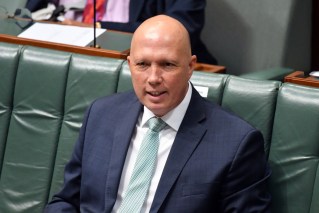Paul Bongiorno: The robodebt royal commission is our most important in a long while

It has taken the robodebt royal commission to do it, but Australians are being given dramatic evidence that the very underpinnings of our system of government have been trashed at great cost to the nation.
In immediate terms, taxpayers were required to foot a $1.8 billion bill to finally put an end to the scandalous illegal scheme and to compensate hundreds of victims.
Former prime minister Scott Morrison always saw the royal commission as political payback from the Labor Party and its former leader Bill Shorten, who he defeated at the 2019 election.
But this inquiry has been given evidence that the outrageous behaviour in the long-running saga was the result of systemic decay that cannot be ignored.
Overdue reality check
What we are getting is a long-overdue reality check on the way in which the engine rooms of governance – the cabinet and the public service – were no longer operating according to the norms and conventions of the Westminster system, let alone the moral imperative to “be honest in the conduct of public office”.
The two issues at play here are the performance of the ministry and the public service.
But make no mistake it is always the Prime Minister who sets the tone and fosters the culture they believe will serve their interests best.
Fine if those interests coincide with the national interest, a disaster if they are misguided and even cruel.
The nobbling of a public service’s ability to give “frank and fearless advice” and the resources to assist in the development of policies to serve the public interest is a crisis that needs to be urgently addressed.
The change of government is a start, but the test for the Albanese government will be whether it will adopt the recommendations of the far-reaching Thodey review of the Australian Public Service (APS) handed to the Morrison government in 2019 and largely discarded for being too big a brake on its power.

Commissioner Catherine Holmes has much to consider after hearing some startling evidence. Photo: AAP/Royal Commission into the Robodebt Scheme
The politicisation of the upper levels of the public service has been occurring for a long time – not many in Canberra can forget John Howard’s “night of the long knives” in 1996 when he sacked 10 departmental heads he suspected of being too close to Labor or tainted after almost 13 years of the Hawke and Keating governments.
Howard’s Liberal successors in the Lodge after 2013 began by cutting $8 billion in savings from the APS and in their first two terms they slashed 19,000 jobs.
Cultural wrecking ball
But one now-retired senior mandarin who served under Liberal and Labor prime ministers says against this background, Morrison’s laying down of the law to the APS after his surprise 2019 election win was a cultural wrecking ball.
In August of that year, he gave a speech to public servants in Canberra defining their jobs only in the narrowest terms of being an obedient cheer squad.
Morrison said: “It’s about telling governments how things can be done, not just the risks of doing them, or saying why they shouldn’t. The public service is meant to be an enabler of government policy and not an obstacle.”
As we are seeing in the royal commission that message was taken to heart as staff second-guessed their ministers – telling them what they wanted to hear or, more to the point, not what they didn’t want to hear.
A notable and indeed brave exception was the Secretary to the Department of Human Services, Renee Leon when Stuart Robert was minister.
Under oath she says she warned the minister of the scheme’s dubious legality, while Robert’s sworn evidence is he has no recollection of this discussion. Leon was subsequently demoted.
Robert had no ambitions to be similarly dealt with by Morrison by giving expression to his “personal massive misgivings”.
The former minister told the royal commission he knowingly gave false answers in TV interviews because as a cabinet minister he had to toe the government’s line if he wanted to remain one.
An incredulous Commissioner Catherine Holmes asked: “Yes, but it doesn’t compel you to say things that you don’t believe to be true, surely?”
Robert shot back: “They were the accepted figures by government to use. It is as a dutiful cabinet minister m’am. That’s what we do.”
“Misrepresent things to the Australian public?” was Holmes’ shocked rejoinder.
Uproar in Parliament
Bill Shorten amid uproar in Parliament on Monday said the story being given to the royal commission by Robert is “there’s a doctrine of collective ministerial responsibility that allowed the previous government to mislead the Parliament”.
The sad take out from what we’ve seen and heard in the commission is that while a couple of public servants were prepared – according to their evidence – to alert ministers, no one in Morrison’s cabinet was prepared to similarly alert the Prime Minister.
Robert only did so at the eleventh hour on the eve of a highly publicised class action against the scheme.
Attorney-General Mark Dreyfus told Parliament, “the Robodebt debacle is one shocking example of what can happen when governments throw accountability above the law. It must never happen again.”
Dreyfus makes much of the fact the Albanese government has set in train a federal anti-corruption commission, but this inquiry shows it should also brush off Thodey’s Our Public Service Our Future report and make up for four lost and dreadful years of self-indulgent neglect and abuse of power.
Paul Bongiorno AM is a veteran of the Canberra Press Gallery, with more than 40 years’ experience covering Australian politics








